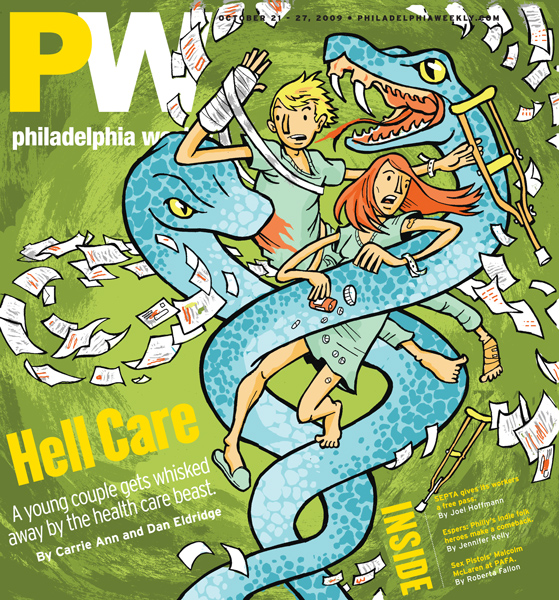 BY DAVE ALLEN Like time, news waits for no man. Keeping up with the funny papers has always been an all-day job, even in the pre-Internets era. These days, however, it’s a two-man job. That’s right, these days you need someone to do your reading for you, or risk falling hopelessly behind and, as a result, increasing your chances of dying lonely and somewhat bitter. That’s why every week PAPERBOY does your alt-weekly reading for you. We pore over those time-consuming cover stories and give you the takeaway, suss out the cover art, warn you off the ink-wasters and steer you towards the gooey center. Why? Because we love you!
BY DAVE ALLEN Like time, news waits for no man. Keeping up with the funny papers has always been an all-day job, even in the pre-Internets era. These days, however, it’s a two-man job. That’s right, these days you need someone to do your reading for you, or risk falling hopelessly behind and, as a result, increasing your chances of dying lonely and somewhat bitter. That’s why every week PAPERBOY does your alt-weekly reading for you. We pore over those time-consuming cover stories and give you the takeaway, suss out the cover art, warn you off the ink-wasters and steer you towards the gooey center. Why? Because we love you!
ON THE COVER
CP: CP’s Music Issue hits some high notes, especially with its interesting and solid – though perhaps unintentional – concentration on female artists. From jazz chanteuse Melody Gardot and tales of her stateside breakthrough to the transformation of Espers’ drone-heavy sound, it’s a welcome change from the typical (not just of CP) focus on dudes with scruffy beards thrumming on guitars. John Vettese’s take on Espers is particularly sharp-eared.
Espers’ self-titled 2004 debut took cues from the ’60s English folk of Fairport Convention and Pentangle,  slowed it down like a 45 played at 33 1/3, and laid it atop airy ambiences. Two years later, the ethereal turned eerie on II, where the sound became thicker and more dissonant; the searing, intense “Dead King” uses an unusual blend of instrumentation (Omnichord, Doric transistored organ, singing bowls) to grip mercilessly onto a mechanical whir that, over many minutes, grows from bewitching to petrifying.
slowed it down like a 45 played at 33 1/3, and laid it atop airy ambiences. Two years later, the ethereal turned eerie on II, where the sound became thicker and more dissonant; the searing, intense “Dead King” uses an unusual blend of instrumentation (Omnichord, Doric transistored organ, singing bowls) to grip mercilessly onto a mechanical whir that, over many minutes, grows from bewitching to petrifying.
Nothing on the new album is that frightening. In fact, subtle touches like the wistful Theremin solo on “Caroline” and the softly plucked major-chord verse of “The Pearl” are some of the most traditionally beautiful things Espers has done. But amid these moments of Fairport at the proper RPM, there still sit unsettling sounds; a discordant change later on in “The Pearl,” the unsettling build of the march-of-humankind study “New Colony.” The band hasn’t softened its sound, per se — it has opened it up.
Dude nails it. In the guy profiles, too, artistry is front-and-center; Adam Arcuragi and Tu Phace aren’t some indie flavors-of-the-month. One’s a longtime Philadelphian who’s left to spread joy in NYC, the other’s taking root in a hip-hop studio collective in South Philly after a childhood of jamming to… Oasis? Seriously? Here’s to the deeply weird Philly music scene,cuz what’s a wonderwall, anyway?
PW: The healthcare debated may have settled down since its bat-shit-crazy town-hall furor this summer, but it’s no less pressing an issue for Americans in need of insurance and, in particular, of a public option. PW jumps into the fray with a dual-bylined article by Carrie Ann and Dan Eldridge, outlining the couple’s struggles with healthcare in Philly and with chronic conditions that make conventional insurance impossible. I’m not sure what role Dan took in the piece, other than maybe some guidance and editing, because it’s definitely Carrie Ann’s story — her voice, her pain, . The details are unsparing, starting with Carrie Ann’s injuries and afflictions and including the rock-and-a-hard-place dilemmas of income limits and pre-existing conditions that make obtaining insurance so difficult.
 In less than an hour’s time, a nurse practitioner will use a small scalpel and a particularly menacing pair of medical scissors to lance and then drain three grotesque abscesses that have been festering underneath the surface of my armpits, in various stages of regression and regeneration, for nearly six months now. I can’t even begin to count the number of medical treatments, procedures and surgeries I’ve undergone at hospitals just like this over the past 10 years, ever since surviving a car accident that nearly cost me my life.
In less than an hour’s time, a nurse practitioner will use a small scalpel and a particularly menacing pair of medical scissors to lance and then drain three grotesque abscesses that have been festering underneath the surface of my armpits, in various stages of regression and regeneration, for nearly six months now. I can’t even begin to count the number of medical treatments, procedures and surgeries I’ve undergone at hospitals just like this over the past 10 years, ever since surviving a car accident that nearly cost me my life.
This is not one of my better days. I feel a tinge of self-pity when I realize I’m starting to fit in quite well with the cornucopia of insanity surrounding me in the waiting area: wheezing and sweaty grandparents in wheelchairs wearing surgical face masks; a bedazzled Bible-toting schizophrenic boxer; an uncontrollably belligerent drunk; and an utterly tragic Iraq war veteran—clearly in the throes of withdrawal—who hasn’t stopped badgering the triage nurse for pain killers since my arrival. In most cities across the nation, emergency rooms have become de facto primary care clinics—where those without health insurance, or without enough health insurance, show up on a regular basis. They do this because they have no choice.
PW has delved into medical narratives before, many of them from the late, great Steven Wells. This one lacks much of Swells’ venom, but it doesn’t descend into self-pity or softness as a result. The mentions of sexual harassment by a family physician make part of the piece seem like an indictment of the medical profession at large, which I found unfair — many doctors are fine human beings doing the best they can within a flawed system — though not as unfair as having to suffer said harassment. Overall, it’s a clear-headed account, rich with detail and self-knowledge. Respect is due for the courage in telling it, as well as for making both the jargon-y medical bits and the harrowing personal tales flow.
INSIDE THE BOOK
CP: I can feel it coming in the Eyre tonight. Things are never easy in Point Breeze. Foaming or watering at the mouth? Ever get the feeling you’ve been cheated?: Not by Malcolm McLaren.
PW: Specter: Donkey or just a jackass? SEPTA: Sitting employees, please take action. Korean food this good deserves a better headline. Give out an A- and then say who could have done it better? Ballsy.
WINNER: I’ll give it to PW this week, because the Eldridges’ struggles, and their retelling of them, really stayed with me. Makes me thankful for good health, which can be even harder to come by than good writing.
